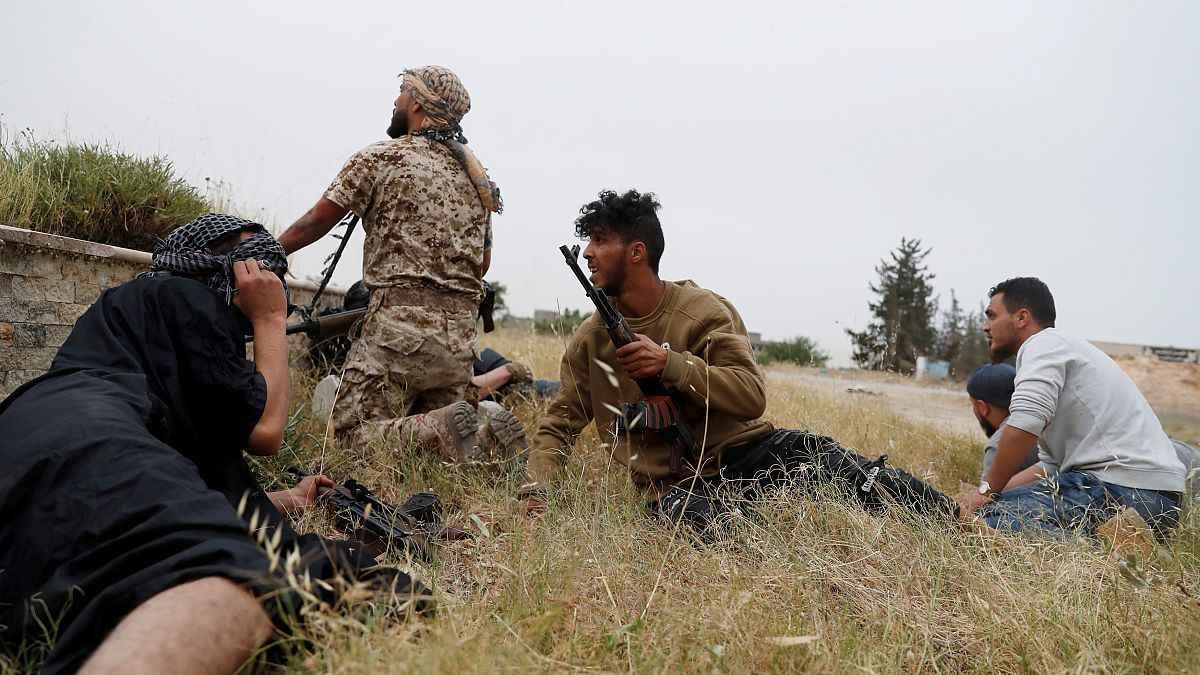"Anyone who dies here, Macron is responsible," the leader of a Libyan militia fighting for the UN-backed Government of National Accord told Euronews.
French President Emmanuel Macron "is responsible" for the casualties in Libya, a fighter loyal to the UN-backed Government of National Accord (GNA) told Euronews, condemning the French leader's meeting with rebel general Khalifa Haftar.
Macron received Haftar for a closed-door meeting in Paris on Wednesday as forces loyal to the strongman's Libyan National Army (LNA) continue to wage an offensive to take the North African country's capital, Tripoli, from the GNA. It came two weeks after the French president hosted the GNA's Prime Minister, Fayez al-Serraj.
For some fighters on the ground, the latest diplomatic overture shows that "Macron is responsible" for "anyone who dies here".
"France, but I don’t mean the French people, I mean Macron, is the one who supported Haftar," Mohamed Khalil Issa, commander of the Yatrib brigade, fighting for the GNA, told Euronews' Anelise Borges at a field hospital near the Ztarna frontline on the outskirts of Tripoli.
France, like the rest of the EU, has officially backed the GNA. However, according to experts, it has also given support to Haftar, whose forces control large swathes of the country, especially in the oil-rich eastern provinces, in an attempt to weaken Islamist militants — although France has never officially admitted to it.
"These three Arabian countries — Egypt, Saudi Arabia and [the United Arab] Emirates — support Haftar but Macron is the biggest devil of them all. Macron supported Haftar both politically and militarily," Issa added.
'Permanent division of the country'
At least 510 people have died and more than 2,460 people have been injured since the LNA started its advance on Tripoli on April 4, according to to the latest figures from the World Health Organisation.
Some 1.6 million people have been impacted by the seven years of protracted conflict and half of them, including 241,000 children, need humanitarian assistance, according to UNICEF.
The UN and the EU have repeatedly called on the two sides to agree to a ceasefire and find a political situation to the conflict, which has been ongoing since the overthrow of dictator Muammar Gaddafi in 2011.
READ MORE: 'They sprayed the room with bullets': migrants in Libyan detention centres living in fear
The UN envoy to Libya, Ghassan Salamé, warned on Tuesday that the country risks "descending into a civil war which could lead to the permanent division of the country" if the fighting in Tripoli is not quickly stopped.
But diplomatic sources in Paris have told Reuters that Haftar informed Macron that the conditions for a ceasefire were not in place.
Serraj also appeared to rule out a ceasefire on Wednesday, telling Euronews that GNA forces "will continue defending our dreams, our capital, our homes and our people until the attack has been stopped and all the invading troops go back from where they came."
'They didn’t fight terrorism'
For Mohamed Khalil Issa, the Yatrib Brigade commander, the fight against Haftar is also one for legitimacy.
Haftar claims his offensive is in the public interest and that only his forces can bring stability to the country. He has also said that the capital is being held by extremist and terrorist groups.
READ MORE: Military assault on Tripoli is "in public's interest', says Libyan rebel group
Originally from Misrata, a coastal town 200 kms east of Tripoli, the Yatrib Brigade say they were among the forces responsible for the victory in the battle for Sirte, known as the "last stand" for the so-called Islamic State (IS) in Libya.
"Those who are coming with him [Haftar] now, they didn’t fight terrorism. We did. The real war which we fought for 7 or 8 months and which resulted in the martyrdom of more than 700 people and injured 12,000," he told Euronews.
"You say you’re fighting terrorism in Tripoli - and that these are terrorists?! They fought Daesh [another name for IS] with me!," he added.
According to the UN, extremists and terrorists have infiltrated or lent their support to forces on both sides of the conflict. It also warned that the battle for the capital is creating a power vacuum for Islamist organisations to regroup.
